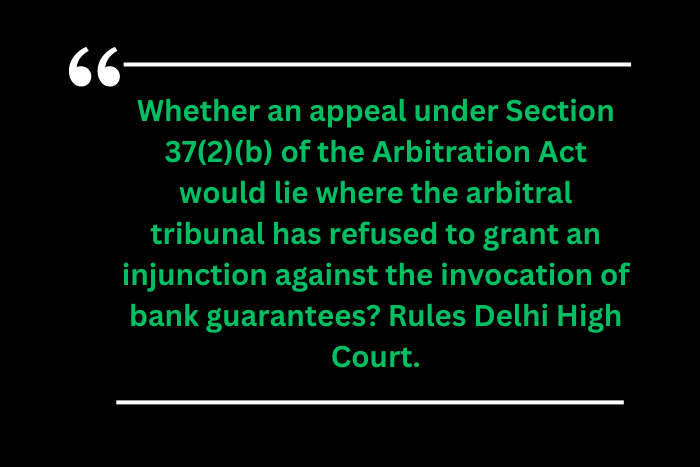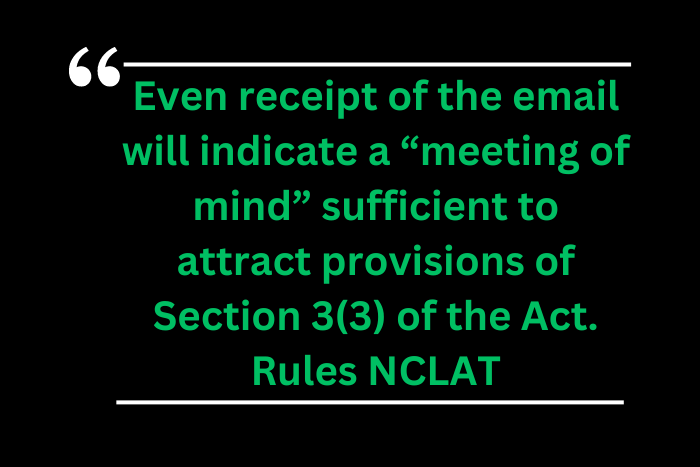The Hon’ble High Court of Delhi (“DHC”) through on 05.04.2024 in Container Corporation of India Limited vs Road Wings International Pvt. Limited [O.M.O.(COMM)499/2022], has held that Section 39(1) of the Act only permits the Arbitral tribunal to have a lien on the award in case of unpaid costs, and there is no provision extending such a right to an institution like ‘Standing Conference of Public Enterprises’ (“SCOPE”), If any lien existed, it would have been within the purview of the Arbitral Tribunal.
Hence, DHC observed that the commencement of the limitation period will be determined from the date of receiving the award from the institution, regardless of any potential lien due to outstanding costs. This includes cases where the institution notifies the parties of unpaid costs after issuing the Arbitral award, and the true copy of the award is withheld until all associated expenses are settled by the petitioner.
Background of the Case
The Petitioner and Respondent entered into a contract on 18th March 2010, tender issuance, accompanied by General Conditions of Contract (GCC). Over time, several disputes arose from this contractual relationship, leading to the initiation of arbitration proceedings under the aegis of the institution SCOPE. An Arbitral Tribunal, led by Hon’ble Mr. Justice (Retd.) Rajesh Tandon was constituted with Mr. O.P. Gupta and Mr. Madhuresh Kumar as Co-Arbitrators.
The Majority Award was issued on 1st June 2022, was signed by all tribunal members, and communicated to parties the same day by the Presiding Arbitrator. The Majority Award acknowledged Mr. Madhuresh Kumar’s dissenting opinion, submitted on 11th June 2022, and received by the Petitioner on 14th June 2022. On 7th June 2022, SCOPE notified parties of a fee recalculation error, requiring additional payments.
The Respondent settled on 18th June 2022, receiving the certified copy of the award on 22nd June 2022. The Petitioner settled their balance on 12/14th July 2022, receiving their copy on 19th July 2022. Relying on this document, the Petitioner filed a petition on 10th October 2022, challenging the arbitral award under Section 34(3) of the Arbitration and Conciliation Act, 1996 (“the Act”). The said appeal was objected to on the ground of limitation period.
Arguments advanced by the Petitioner.
The Petitioner presents two primary arguments to justify the timelines of filing their application under Section 34 of the Act. Firstly, they argue that since the Arbitral Tribunal was constituted under the auspices of SCOPE, the Arbitral proceedings should be categorized as Institutional Arbitration. Therefore, the limitation period should be calculated from the date the parties received the certified copy of the Arbitral award from SCOPE, which according to the Petitioner, was on 19th July 2022.
If this date is accepted as the start date of the limitation period, their filing, made within three months thereafter, encounters no delay. Alternatively, the Petitioner contends that an arbitral award achieves finality and completeness only upon the delivery of both the majority award and any minority or dissenting opinions. Since the dissenting opinion was received by the Petitioner on 14th June 2022, they argue that the limitation period must be reckoned from this date.
This places the filing of the petition within the condonable limit of three months plus thirty days, as provided under Section 34(3) of the Act. The Petitioner claims to have sufficient cause to justify this delay, therefore, it deserves to be condoned. In either case, the Petitioner asserts adherence to the statutory limitation and claims that this application has been filed to preempt any procedural objections by the Respondent.
Arguments advanced by the Respondent.
The Respondent vehemently opposed the application, asserting that the limitation period should commence from the day the parties received the majority award, i.e., from 1st June 2022. According to this interpretation, the instant petition was filed beyond the maximum allowable period for condonation three months plus an additional thirty days as stipulated by Section 34(3) the Act and its proviso. Therefore, the Respondent argued that the DHC lacked the discretionary power to condone such delay, thereby rendering the petition barred by limitation and liable to be dismissed.
Conclusion by the DHC
The DHC, regarding the effect of the communication issued by SCOPE on 7th June 2022, as mentioned in the preceding paragraphs, observed that although the Petitioner argued that SCOPE effectively exercised a lien over the Arbitral award until the balance charges were cleared by the parties, in accordance with Section 39(1) of the Act, the argument lacked merit. The Petitioner contended that since they received the certified copy of the award from SCOPE upon clearing the dues on 19th July 2022, the limitation period should commence from that date. However, the DHC opined that the Petitioner’s argument was untenable for several reasons.
Firstly, Section 39(1) of the Act only permits the Arbitral tribunal to have a lien on the award in case of unpaid costs, and there is no provision extending such a right to an institution like SCOPE. While other institutions have explicitly incorporated the right to exercise a lien over the award in their procedural rules, there is no corresponding provision in the SCOPE Rules. Therefore, SCOPE lacked the authority to exercise such a lien over the award. If any lien existed, it would have been within the purview of the Arbitral Tribunal, which chose not to exercise it in this case.
Secondly, there is no provision mandating the issuance of a certified copy of the award to complete delivery. Thus, when SCOPE issued its communication on 7th June 2022, the parties had already been notified of the Arbitral award made on 1st June 2022, and the limitation period had commenced. Additionally, the Petitioner significantly delayed in clearing their dues, resulting in the delayed receipt of the certified copy of the award on 19th July 2022. Allowing limitation to be calculated from this date would unfairly advantage the Petitioner’s delay and unilaterally extend the permissible period for filing their application under Section 34(1) of the Act.
Consequently, the DHC determined that since the Arbitral award was received by the parties on 1st June 2022, the limitation period under Section 34(3) of the Act should be calculated from the following day, i.e., from 2nd June 2022. Thus, the permissible period of three months expired on 2nd September 2022, and the extended period of thirty days, as allowed by the proviso to Section 34(3) of the Act, expired on 2nd October 2022. However, the instant petition was filed on 10th October 2022.
It is well-established in law that any delay beyond the period of three months plus thirty days cannot be condoned, regardless of whether sufficient cause is presented for such delay.
In light of the above, the delay in filing the present petition, which exceeds the overall condonable period under Section 34(3) of the Act, cannot be condoned. Therefore, the appeal filed was dismissed.
…
Contact us at hello@lawgacy.com to feature your firm’s deals, articles, columns, or press releases.


